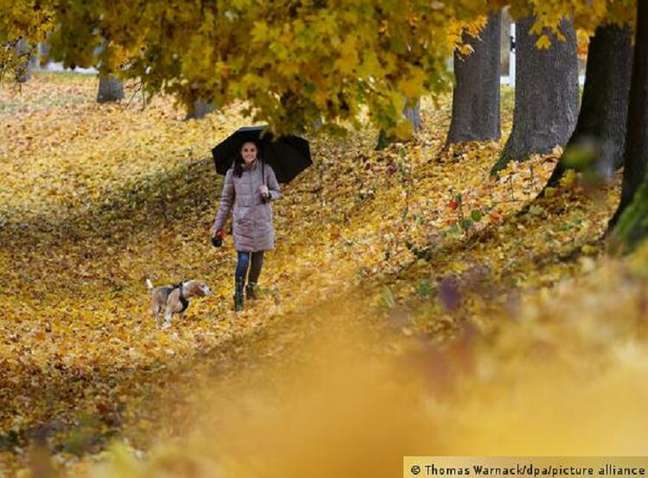Relaxing after working hard to solve a problem can produce an epiphany.
It is said that the Greek mathematician Archimedes was in the bathtub when the solution to the problem that tormented him came to mind.
Observing that the water level increased as it entered the tub, Archimedes concluded that the volume of an object can be determined by measuring the amount of water it displaces.
“Eureka!” (I found it!), He would have screamed, before jumping out of the tub and running naked through the streets of Syracuse.
epiphanies like this they are the spark of many scientific discoveries. And even dreams are often fertile ground for sudden and unexpected revelations.

Relaxing or repetitive activities help the mind wander and create free connections between ideas.
(Photo: Thomas Warnack / dpa / picture alliance)
After three days of intense reflection, Dmitri Mendeleev came up with the idea for the periodic table while he slept. And Friedrich August Kekulé imagined the chemical structure of benzene when he dreamed of a snake biting its own tail.
Walking and traveling also helps. “A storm has begun” in Albert Einstein’s brain when he was inside a tram in Bern, Switzerland, in 1905, and looked at the famous clock tower, leading him to later formulate the Theory of Relativity.
Eighteen years after that event, the idea of the nuclear chain reaction – central to the atomic bomb – came to Leo Szilard as he waited at a traffic light in London.
Hard work and relaxation
Why does relaxing help to have revelations? The above examples, after all, are epiphanies that occurred when scientists weren’t working.
Theories of psychology state that the mind needs relaxation periods to give vent to creativity. Of course, a walk is not enough to discover the century. There is another important factor: hard work and a lot of thought devoted to one topic.
All of the epiphanies mentioned above occurred after long periods of intense dedication to a topic. For days, Archimedes had been puzzling to calculate the volume of gold in King Heiro’s crown.
Kekulé was taking a nap, with his head on the work table, after a particularly stressful day in which he dreamed of the circular structure of the benzene molecule.
There is no known formula for inducing epiphanies, but the combination of hard work and deep relaxation seems to be a good thesis.
Hiking helps you think better
But research shows that not all ways to relax are stimulating.
According to a 2022 study, the best ways to ignite a spark in the brain are simple activities that keep you busy without being boring, like walking, showering, knitting. The counterexamples are watching a boring movie or scrolling through social media.
According to experts, tasks with repetitive movements help the mind to wander and create free connections between ideas. The same goes for walks, which both Aristotle and William Wordsworth and Friedrich Nietzsche considered the best time to think.
The psychology behind the epiphanies
Not only do scientists have epiphanies: from time to time everyone has bright ideas, and they occur in the same way as the ideas of privileged minds.
It can be in the supermarket, it can be in the shower, and suddenly: “Eureka!”, An idea comes out of nowhere and dominates thoughts.
The founder of analytical psychology, Carl Gustav Jung, had an explanation: he described epiphanies as moments of communication between the unconscious and the conscious, of “unexpected knowledge”.
In other words, the emergence of data and connections deeply immersed in the unconscious, which has not yet been thought of. In the Jungian view, epiphanies would therefore be rare moments in which the unconscious erupts into the conscious.
This phenomenon cannot be planned: it just happens, out of control. But the best way to achieve it is intense reflection followed by relaxation. At this point, unexpected solutions to everyday problems may emerge – or until the next scientific revelation.
+The best content in your email for free. Choose your favorite Earth Newsletter. Click here!
Source: Terra
Benjamin Smith is a fashion journalist and author at Gossipify, known for his coverage of the latest fashion trends and industry insights. He writes about clothing, shoes, accessories, and runway shows, providing in-depth analysis and unique perspectives. He’s respected for his ability to spot emerging designers and trends, and for providing practical fashion advice to readers.




![Tomorrow belongs to us: What awaits you on Tuesday, July 15, 1987, July 15, 2025 [SPOILERS] Tomorrow belongs to us: What awaits you on Tuesday, July 15, 1987, July 15, 2025 [SPOILERS]](https://fr.web.img3.acsta.net/img/ec/5b/ec5be625b7977834b0470366ee256862.jpg)



